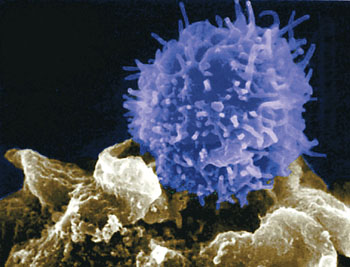Ecoclimber
Senior Member
- Messages
- 1,011
Permission to repost from Prof. G
EBV and HHV-6 reactive cells concentrated in the CNS
Is MS caused by a virus? T cells reactive againts HHV-6 and EBV may provide a clue. #MSBlog #MSResearch
"The study below suggests that T cells responding to specific herpes viruses are enriched in the spinal fluid of MSers and not T cells responding to brain proteins or antigens.
This is fascinating and suggests that the herpes viruses HHV-6 and EBV, but not CMV, are involved in the pathogenesis of MS.
T cells are the immune cells responsible for orchestrating memory immune responses and are hence very important read-outs of what is happening in the brains and spinal cords of MSers.
The fact that an effective MS treatment such as Daclizumab reverses these T cell responses indicates that they may be important in MS and a marker of disease activity.
History may judge this paper as being very important, once we pin down the cause of MS we may be able to use the methods described in this paper to prove causation. This paper clearly supports the viral hypothesis of MS."

T cell

PLoS One. 2014; 9(8): e105434.
Published online Aug 22, 2014. doi: 10.1371/journal.pone.0105434
PMCID: PMC4141762
A Complex Role of Herpes Viruses in the Disease Process of Multiple Sclerosis
Simone C. Wuest,1 Ina Mexhitaj,1 Noo Ri Chai,1 Elena Romm,1 Joerg Scheffel,2 Biying Xu,3 Kelly Lane,3 Tianxia Wu,4 and Bibiana Bielekova1,*
Christoph Kleinschnitz, Editor
Background:
MS is a chronic inflammatory disorder of the central nervous system (CNS). Neither the antigenic target(s) nor the cell population(s) responsible for CNS tissue destruction in MS have been fully defined.
Objective:
The objective of this study was to simultaneously determine the antigen (Ag)-specificity and phenotype of un-manipulated intrathecal CD4+ and CD8+ T cells of patients with relapsing-remitting and progressive MS compared to subjects with other inflammatory neurological diseases.
Methods:
We applied a novel Ag-recognition assay based on co-cultures of freshly obtained cerebrospinal fluid T cells and autologous dendritic cells pre-loaded with complex candidate Ag's.
Results:
We observed comparably low T cell responses to complex auto-Ag's including human myelin, brain homogenate, and cell lysates of apoptotically modified oligodendroglial and neuronal cells in all cohorts and both compartments.
Conversely, we detected a strong intrathecal enrichment of Epstein-Barr virus- and human herpes virus 6-specific (but not cytomegalovirus-specific) reactivities of the Th1-phenotype throughout all patients. Qualitatively, the intrathecal enrichment of herpes virus reactivities was more pronounced in MS patients.
This enrichment was completely reversed by long-term treatment with the IL-2 modulating antibody daclizumab, which strongly inhibits MS disease activity.
Finally, we observed a striking discrepancy between diminished intrathecal T cell proliferation and enhanced cytokine production of herpes virus-specific T cells among progressive MS patients, consistent with the phenotype of terminally differentiated cells.
Conclusion:
The data suggest that intrathecal administration of novel therapeutic agents targeting immune cells outside of the proliferation cycle may be necessary to effectively eliminate intrathecal inflammation in progressive MS.
EBV and HHV-6 reactive cells concentrated in the CNS
Is MS caused by a virus? T cells reactive againts HHV-6 and EBV may provide a clue. #MSBlog #MSResearch
"The study below suggests that T cells responding to specific herpes viruses are enriched in the spinal fluid of MSers and not T cells responding to brain proteins or antigens.
This is fascinating and suggests that the herpes viruses HHV-6 and EBV, but not CMV, are involved in the pathogenesis of MS.
T cells are the immune cells responsible for orchestrating memory immune responses and are hence very important read-outs of what is happening in the brains and spinal cords of MSers.
The fact that an effective MS treatment such as Daclizumab reverses these T cell responses indicates that they may be important in MS and a marker of disease activity.
History may judge this paper as being very important, once we pin down the cause of MS we may be able to use the methods described in this paper to prove causation. This paper clearly supports the viral hypothesis of MS."

T cell

PLoS One. 2014; 9(8): e105434.
Published online Aug 22, 2014. doi: 10.1371/journal.pone.0105434
PMCID: PMC4141762
A Complex Role of Herpes Viruses in the Disease Process of Multiple Sclerosis
Simone C. Wuest,1 Ina Mexhitaj,1 Noo Ri Chai,1 Elena Romm,1 Joerg Scheffel,2 Biying Xu,3 Kelly Lane,3 Tianxia Wu,4 and Bibiana Bielekova1,*
Christoph Kleinschnitz, Editor
Background:
MS is a chronic inflammatory disorder of the central nervous system (CNS). Neither the antigenic target(s) nor the cell population(s) responsible for CNS tissue destruction in MS have been fully defined.
Objective:
The objective of this study was to simultaneously determine the antigen (Ag)-specificity and phenotype of un-manipulated intrathecal CD4+ and CD8+ T cells of patients with relapsing-remitting and progressive MS compared to subjects with other inflammatory neurological diseases.
Methods:
We applied a novel Ag-recognition assay based on co-cultures of freshly obtained cerebrospinal fluid T cells and autologous dendritic cells pre-loaded with complex candidate Ag's.
Results:
We observed comparably low T cell responses to complex auto-Ag's including human myelin, brain homogenate, and cell lysates of apoptotically modified oligodendroglial and neuronal cells in all cohorts and both compartments.
Conversely, we detected a strong intrathecal enrichment of Epstein-Barr virus- and human herpes virus 6-specific (but not cytomegalovirus-specific) reactivities of the Th1-phenotype throughout all patients. Qualitatively, the intrathecal enrichment of herpes virus reactivities was more pronounced in MS patients.
This enrichment was completely reversed by long-term treatment with the IL-2 modulating antibody daclizumab, which strongly inhibits MS disease activity.
Finally, we observed a striking discrepancy between diminished intrathecal T cell proliferation and enhanced cytokine production of herpes virus-specific T cells among progressive MS patients, consistent with the phenotype of terminally differentiated cells.
Conclusion:
The data suggest that intrathecal administration of novel therapeutic agents targeting immune cells outside of the proliferation cycle may be necessary to effectively eliminate intrathecal inflammation in progressive MS.
Last edited:
